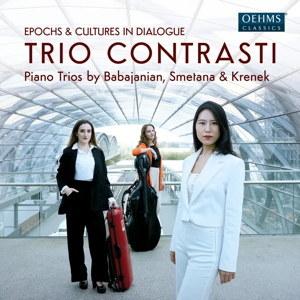
Epochs & Cultures in Dialogue
Arno Babajanian (1921-1983)
Piano Trio (1952) in F-sharp minor
Bedřich Smetana (1824-1884)
Piano Trio in G minor, Op 15
Ernst Krenek (1900-1991)
Trio Fantasy (1929), Op 63
Trio Contrasti
rec. 2024, Katharinensaal, Hochschule für Musik und Theater, Rostock, Germany
Oehms Classics OC1735 [63]
The booklet notes present this programme as a three-stage progression: first: Pure Romanticism (Smetana); second: Modern Neo-romanticism (Krenek) and third: Modern Nationalism, reflected in romanticism (Babajanian), although on the disc they come in a different order (3,1,2). As the notes point out, the Romantic period was a seminal development in the world of the arts; music became the dominant art form with the move to create recognisable national styles and identities.
The impetus behind the piano trio by Bedřich Smetana was tragedy. The composer sought refuge by pouring out the emotion he felt over the loss of two daughters in two years (Gabriela in 1854 and Bedřiska in 1855). The tragic main theme of the first movement is contrasted with reflections of happier times as a salve for the pain, the pleasant memories helping to dispel the feelings of crushing pain. The second movement is a much sunnier affair; though fateful themes intercede. The finale is sweet; the music reflects shafts of light through darkness, though towards the end a funeral march enters to bring the work to a close, despite even that element being dissipated in a flourish of notes.
I don’t know the music of Ernst Krenek well enough to know to what extent his Trio Fantasy is a departure from his usual style. Listening to some extracts of his string quartets, piano concertos and his Sinfonia No 1 indicates that he mostly wrote music clearly 20th century in character. He determined to seek new paths in music in common with most composers writing in the 1920s, which is when Krenek’s music really got under way. That said, his Trio Fantasy certainly harks back to those heady days when Romanticism was the dominant mode of expression, with that sweep of lush rhythms that is almost redolent of musical perfume. The booklet writer finds it has more in common with Mahler than Schubert, whose influence is indicated, and inspired his Reisebuch aus den österreichischen Alpen (Travelogue of the Austrian Alps (1929). I have read that Krenek worked on the completion of Mahler’s 10th Symphony, but I must confess I cannot hear anything remotely Mahlerian about it. It reminds me more of the contrast between the music one normally associates with Schoenberg and that composer’s Verklärte Nacht, whose Romantic character surprises those who think only of the twelve-tone system when they think of Schoenberg. I then read that, indeed, Schoenberg was Krenek’s teacher, so I think I may be barking up the right tree. However, to judge Krenek’s Trio Fantasy on its own merits, I found it an extremely affecting work of considerable beauty which repays multiple listenings. It is a perfect example of the Modern Neo-romanticism the work is on the disc represents.
Having listened to the works in the order the programme is designed to illustrate, I came to the piano trio by Arno Babajanian. It is a good choice to illustrate that stage in the progression from Romanticism to Modern nationalism, reflected in Romanticism. I was nevertheless intrigued by the choice of a composer who, I feel sure, will be known to a very small number of listeners. Perhaps it was chosen because of the strong strains of Armenian folk melodies apparent from the very beginning, standing for the nationalist nature. This time I am in full agreement with the notes which highlight the passionate nature of the music and its heavy mix of pathos which serves to tug well and truly on the heartstrings. I also concur with the writer’s assertion that there is a powerful and easily attributable connection with Rachmaninov, who Babajanian so admired and whose love of Romanticism no one would dispute. This is a work that deserves to be better known, full of the most lovely melodies, rich harmonies and the most beautiful tunes that will stay long in the memory. There is even that feeling that you must have heard it before, even though that is unlikely; this is particularly true of the beginning of the second movement, marked Andante, which is the heart of the romantic element in this lovely trio. The final movement opens with a thrillingly energetic tune based on a traditional Armenian folk dance which is followed by a gentle second theme and later both themes appear alongside each other. There is no doubt you will want to hear this trio many times, with each hearing revealing more of its beguiling character.
In the three years that this young trio, comprising musicians from Armenia, Russia and China, has been in existence, it has gained much success and many engagements. That is hardly surprising, as it is an excellent trio, whose musicianship speaks for itself in all three of the works on this disc. It is always heartening to hear how committed young artists are and they deserve as much exposure as they can get. The repertoire here is interesting and the playing is excellent, as is the sound. The Smetana, of course, is well known, the Krenek less so and the Babajanian almost entirely unknown; it is well worth getting to know and it could hardly want for a better performance to help that happen. I wish the disc much success.
Steve Arloff
Buying this recording via a link below generates revenue for MWI, which helps the site remain free.




















